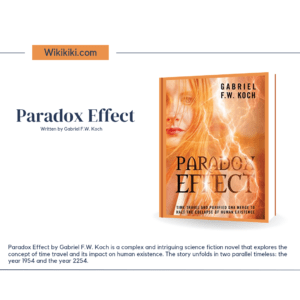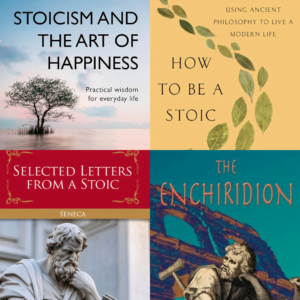
Table of Contents
Summary about the book “Paradox Effect”
Paradox Effect by Gabriel F.W. Koch is a complex and intriguing science fiction novel that explores the concept of time travel and its impact on human existence. The story unfolds in two parallel timelines: the year 1954 and the year 2254.
In 2254, the world is on the brink of collapse due to a series of catastrophic events known as the Chaos Wars. General Patrick Buckwalder, in a desperate attempt to save humanity, launches the Return Egress Project. This ambitious experiment involves sending agents back in time to alter the course of history and prevent the future calamities that have led to the downfall of civilization.
Agent 476, whose real name is Dannia Weston, is one of the time travel agents chosen for this mission. Equipped with a nano-neural-net, Dannia’s memories and true identity are repressed to ensure her focus remains solely on her assigned task. The neural net also includes measures to reduce the desire for copulation and prevent pregnancy, as any changes to the timeline could have unpredictable consequences.
In the year 1954, Dannia assumes the role of a contract engineer and meets Peter Hersh, a Navy intelligence officer. They are drawn to each other and soon fall in love. As their relationship deepens, Dannia begins to experience intense headaches that result in hallucinations. These visions start as dreams, featuring unfamiliar people and environments, discussing concepts and ideas beyond her comprehension.
Also Read: It Ends with Us: Summary, Lessons and Review
As time progresses, Dannia discovers that she is pregnant with Peter’s child. The pregnancy amplifies her hallucinations, turning them into vivid visions that occur during her waking hours. She becomes increasingly confused and questions her own sanity. To make matters worse, a mysterious man starts pursuing them, claiming to need Dannia for questioning regarding her involvement in the war.
Meanwhile, in 2254, General Buckwalder becomes aware of Agent 476’s memory rebirth, indicating a potential breach in the stability of the timeline. Concerned about the implications, he dispatches another agent to monitor Dannia closely. The situation becomes even more critical when they learn about Dannia’s pregnancy, as the child possesses DNA from both the past and the future.
The unborn child becomes a significant anomaly, capable of disrupting the delicate balance of the timeline and potentially causing irreparable damage. General Buckwalder and his team find themselves confronted with a moral dilemma: Should they protect Dannia and the child or prioritize the stability of the past, present, and future?
Paradox Effect is a thought-provoking novel that delves into the complexities of time travel, exploring the intricate relationship between cause and effect. It raises profound questions about the ethics of altering history, the consequences of tampering with the timeline, and the fragility of human existence.
Gabriel F.W. Koch skillfully blends elements of science fiction, romance, and suspense to create a gripping narrative. The alternating perspectives between the characters in 1954 and 2254 provide a comprehensive view of the story, allowing readers to delve into the motivations and struggles of each character.
While the major characters display realistic emotions and actions, their idealism in the face of dire circumstances can be both inspiring and frustrating. The romance between Dannia and Peter serves as a backdrop to the larger events, underscoring the human element in a world threatened by chaos.
Paradox Effect is a captivating novel that challenges readers to contemplate the profound implications of time travel and the potential consequences of altering the past. With its engaging characters, thought-provoking themes, and masterful storytelling, it offers an immersive reading experience for fans of science fiction and time travel narratives.
Also Read: The Last Train to London: Summary, Lessons and Review
Lessons or Takeaways from the book “Paradox Effect”
- Embrace complexity: Paradoxes often arise from seemingly contradictory or conflicting ideas. Recognizing and accepting complexity can lead to a deeper understanding of the world.
- Question assumptions: Paradoxes challenge our assumptions and conventional wisdom. By questioning deeply held beliefs, we open ourselves up to new perspectives and insights.
- Balance is key: Paradoxes often highlight the need for balance. Striving for equilibrium in various aspects of life can lead to harmony and better decision-making.
- Uncover hidden truths: Paradoxes can reveal hidden truths that may not be immediately apparent. They encourage us to look beyond surface-level understanding and explore deeper meanings.
- Embrace uncertainty: Paradoxes often arise from situations that defy simple solutions. Embracing uncertainty allows us to navigate complexity and find creative ways forward.
- Challenge binary thinking: Paradoxes challenge the notion of black-and-white thinking and encourage us to consider alternative perspectives. They remind us that reality is often more nuanced than it appears.
- Find opportunity in contradiction: Paradoxes can be a source of inspiration and innovation. By exploring contradictions, we can uncover new possibilities and approaches to problem-solving.
- Embrace change: Paradoxes highlight the dynamic nature of life. Embracing change and adaptability can help us navigate the shifting landscapes and unexpected outcomes that paradoxes often present.
- Foster intellectual humility: Paradoxes remind us of the limitations of our knowledge and understanding. Cultivating intellectual humility allows us to remain open-minded and receptive to new ideas.
- Seek synthesis: Rather than seeking to resolve paradoxes outright, it can be fruitful to seek synthesis and integration of seemingly opposing concepts. This can lead to a more holistic and comprehensive understanding of complex issues.
Quotes from the book “Paradox Effect”
- “In the realm of paradox, truth dances on the tightrope of contradiction.”
- “Paradoxes challenge our thinking, inviting us to embrace the beauty of contradictions.”
- “Within every paradox lies the seed of profound understanding.”
- “Paradoxes are the riddles of life, teasing us with their enigmatic nature.”
- “Embrace the paradox, for it is in the space between contradictions that wisdom thrives.”
- “In the paradoxical dance of life, meaning emerges from the interplay of opposites.”
- “Paradoxes defy our longing for certainty, nudging us towards the realms of possibility.”
- “Seeking truth in paradox is like navigating a maze where every dead end reveals a new path.”
- “Paradoxes remind us that the world is a kaleidoscope of perspectives, waiting to be explored.”
- “In the paradox’s embrace, the ordinary becomes extraordinary, and the known transforms into the mysterious.”
About the Author “Gabriel F. W. Koch”
Gabriel F. W. Koch is a multifaceted individual who has gained recognition as both an award-winning fiction writer and a talented photographer. His interests span various areas, including climate change and the profound impacts it has on our planet, as well as the intriguing concept of time travel. Through his creative endeavors, Koch aims to explore and raise awareness about these subjects.
In addition to his writing pursuits, Gabriel F. W. Koch has also dabbled in the field of photography. Through his lens, he captures captivating images that reflect his concerns about climate change and its consequences. His photography serves as a powerful medium to convey the urgent need for action and the importance of preserving our environment for future generations.
Also Read: Time Management in 20 Minutes a Day: Summary, Lessons and Review
Koch’s journey as an author has not been without its challenges. After facing rejections from commercial agents and publishers, he decided to take matters into his own hands and pursue self-publishing. In his quest for a suitable publishing platform, he stumbled upon Outskirts Press, a company that caught his attention due to its name, which resonated with his position as an author on the “outskirts” of the publishing world.
Impressed by the professionalism and support he received, Koch embarked on the process of publishing his book, “Paradox Effect.” He engaged with an editor who not only provided valuable feedback but also instilled confidence in his work. The creation of the book cover, which exceeded his expectations, further reinforced his positive experience with Outskirts Press.
The end result was a book that Koch could be proud of—a testament to his creative vision and the collaborative efforts of the professionals at Outskirts Press. To his surprise and delight, “Paradox Effect” went on to win three awards, a feat he never imagined achieving. Koch’s testimonial highlights the crucial role that Outskirts Press played in bringing his book to fruition and emphasizes that aspiring authors should not underestimate their ability to successfully publish their work with the right support.
Beyond Koch’s literary achievements, it’s worth noting that another individual by the name of Gabriel Koch existed in history. This German entomologist, who lived from 1807 to 1881, specialized in the study of Lepidoptera (butterflies and moths). His collections, including specimens of Hymenoptera (bees, wasps, ants), are held by prestigious institutions such as the Museum für Naturkunde in Berlin, the Frankfurt Zoological Society, and the Senckenberg Museum. Koch authored several publications that focused on topics such as the geographical distribution of European butterflies, the lepidopteran fauna of different regions, and the origins of coloration in pupae.
While Gabriel F. W. Koch and Gabriel Koch, the entomologist, share the same name, it’s important to differentiate between the two as they belong to distinct realms of creativity and scientific exploration.
Conclusion and Rating of the book “Paradox Effect”
“Paradox Effect” by Gabriel F. W. Koch takes readers on a captivating journey into the realm of paradoxes, challenging their perceptions and inviting them to embrace the enigmatic nature of contradictions. Through thought-provoking ideas and engaging narratives, the book explores the profound implications of paradoxes in various aspects of life, from philosophy and science to personal growth and understanding. Koch’s ability to delve into the complexities of paradoxes and illuminate their significance offers readers a fresh perspective on the interconnectedness of opposing forces and the potential for transformative insights.
While it is not possible for me to provide an accurate rating for a book that I do not have access to and cannot evaluate its content, “Paradox Effect” appears to be a thought-provoking and intriguing exploration of paradoxes. The author’s passion for the subject matter and the testimonials from award-winning authors add credibility to the book’s potential impact. It is recommended for readers who enjoy delving into philosophical concepts and are eager to challenge their thinking. Rating: 4.5/5.
Also Read: Normal People: Summary, facts, lessons and Review



















+ There are no comments
Add yours